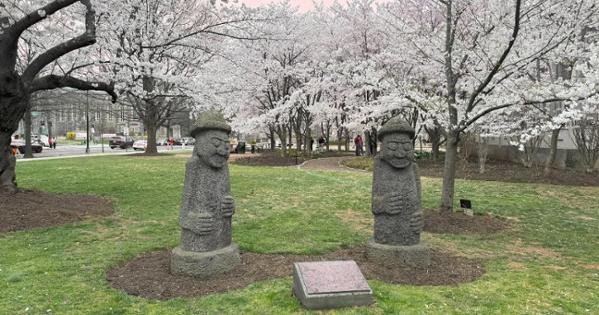From Passive to Active Victimhood in the Shadow of State Violence

On April 8, 1943, President Syngman Rhee -- who would later become the first President of the Republic of Korea -- and AU President Paul Douglass planted cherry trees from Jeju Island near AU’s East Quad Building, in support of Korea’s independence. In 2011, Korea donated a pair of dol harubang statues—iconic stone guardians from the island—as additions to this garden.
SPA Assistant Professor Irene Hyangseon Ahn wishes that more AU students understood the statues’ significance, and the irony of Rhee’s involvement. These protectors stood witness to an oft-overlooked historical tragedy: the Jeju April 3 Incident (hereafter “Jeju 4.3”). Rhee authorized much of the related brutality, making the AU Korean Garden a testament to the tension between nationalist efforts and state violence.
“In the Jeju dialect, dol harubang means ‘grandfather rock,’” said Ahn. “Their presence here at AU deeply moved me, as someone from South Korea, and as a scholar working on Jeju 4.3.”
In the years of “peacetime” between World War II and the Korean War, the escalation of a civilian protest against police brutality on the island resulted in a counterinsurgency campaign by the South Korean/U.S. military government, who accused protestors of Communist ties. This period of political repression and violence (1947-1954), resulted in 25,000 deaths and many more imprisonments and disappearances, all silenced by the regime for decades.
“Geopolitically, the Jeju 4.3 incident was a crucial moment in our Cold War history,” said Ahn. “It reveals how anti-Communist ideology shaped brutal domestic repression, even before the Korean War officially began.”
To raise awareness about these events and advance the study of victimhood in historical grievance, Ahn published “Empowering Victimhood Through Litigation: Trials from the Jeju April 3 Uprising and Political Repression” in Law & Social Inquiry earlier this month. The article examines how litigation can transform victim identities, from passive and powerless to active and empowered, by allowing survivors and families to actively engage in the legal process.
For her study, Ahn examined archival research and interviewed 62 survivors, family members, activists, and lawyers, in the context of two trials. In a 1999 defamation lawsuit against a German newspaper (Case No.99 Gahap 2702), bereaved families—not formal legal parties—began to step forward. The 2017-2019 retrial process (Case No.2017 Jaego Hap 4) established their full legitimacy, erasing their criminal records and acknowledging them as victims.
“Victimhood is not just defined by legal status,” she concluded. “Even though they are victims, the stigma was very heavy, and they were labeled as Communists, Reds, or rioters, which prevented them from speaking out.”
In Ahn’s framework, passive victimhood refers to legal status granted by the government, and active victimhood represents a subject’s personal recognition of victim status and willingness to publicly speak out and engage in social actions. Ahn analyzed interviews by assigning subjects to one or more of three overlapping dimensions of victimhood: performing, socializing, and mobilizing.
“I think these dimensions show, beyond the effect of the ruling itself, the space in which empowerment can occur,” said Ahn. “One can be empowered and move to active victimhood at, say, a play, or a forum. Litigation can be a turning point, transforming silent sufferers into agents of change, but it's not automatic. There is a process involving these three dimensions.”
This study contributes to the scholarship on legal mobilization and identity transformation, particularly in the contexts of state violence and historical grievances. In addition, it comes on the heels of the first Korean woman winning the Nobel Prize in literature––Han Kang, whose 2021 novel We Do Not Part discussed the massacre and its traumatic legacy, with emphasis, like Ahn, on bereaved families and convicted victims.
Ahn, whose research examines how law shapes people’s sense of identity, memory, and justice in the shadow of state violence or injustice, spent over a year on the island researching Jeju 4.3. “It was an emotionally profound experience for me,” she shared. “Most are survivors, in their 70s, 80s, or 90s . . . I was very honored to listen to their voices before they passed away.”
She hopes that AU students and faculty will read the article, and that the AU connection will increase its impact.
“And perhaps, when passing by one of the harubang on campus, they might pause and reflect, if only briefly, on the Jeju 4.3 Incident.”